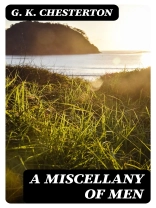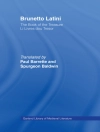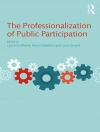In ‘A Miscellany of Men, ‘ G. K. Chesterton presents a collection of essays that delve into a rich tapestry of human experience, illustrating his signature blend of wit and wisdom. The work, written in Chesterton’s characteristic exuberant style, employs vivid imagery and incisive argumentation to explore diverse topics, from philosophy to the nature of man. The literary context of this collection situates it within the early 20th century, a time marked by social upheaval and philosophical questioning, inviting readers to ponder the complexities of humanity through Chesterton’s thought-provoking lens. G. K. Chesterton, an English writer, philosopher, and theologian, became a prominent figure in literary circles due to his keen insights and distinctive voice. His background in journalism and his deep-rooted interest in the mysteries of faith and humanity profoundly influenced his writings. The essays in this collection reflect his admiration for the commonplace and his belief in the extraordinary potential of the human spirit, shaped by his experiences in a rapidly changing world. ‘A Miscellany of Men’ is an essential read for those seeking to understand the interplay between humanity’s virtues and vices. Chesterton’s engaging prose and philosophical musings invite readers to reflect on their perceptions of the world, making this collection a timeless exploration of the intricacies of being human.
A propos de l’auteur
Gilbert Keith Chesterton (1874-1936) was a prolific English critic, novelist, and poet, known for his distinctive wit and brilliant use of paradox. Chesterton’s work spans a variety of genres, reflecting his broad-ranging intellectual interests and capacity for social commentary. Perhaps his most famous creation is the priest-detective character Father Brown, which appeared in ‘The Innocence of Father Brown’ and subsequent series, showcasing his aptitude for detective fiction. Another significant contribution includes ‘Orthodoxy’ (1908), an autobiographical account of his spiritual journey and the rationale for his Christian beliefs, illustrating his profound influence in religious and philosophical spheres. ‘A Miscellany of Men’ is a lesser-known but insightful collection of essays that embrace Chesterton’s wit and wisdom, offering a rich exploration of various human character types with characteristic commentary on society. Beyond specifics, Chesterton penned ‘The Man Who Was Thursday’ (1908), a metaphysical thriller, and ‘What’s Wrong With the World’ (1910), demonstrating his concern with societal reform and the betterment of mankind. A defining feature of Chesterton’s literary style is his ability to combine humor with serious reflection on morality and human nature, thus appealing to a broad readership and leaving a lasting legacy in the world of literature.












